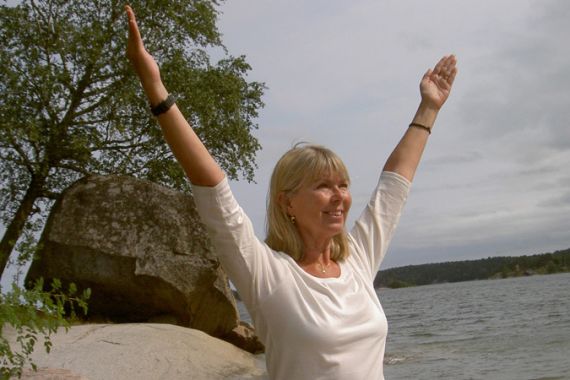
‘I schedule my life around my fatigue’
Anette sometimes finds it hard just to get out of bed, but she says yoga and meditation help her cope with MS.
I live with my dear husband, Janne, and he gives me a lot of support to cope with MS. He takes me shopping, for instance, and drives me around when I have things I want to go to. My main symptoms are pain, weakness in my muscles and balancing problems. I also experience some cognitive problems.
I have to schedule my life around my fatigue. I don’t go to parties or big events any more, I don’t like big shops and I’ve given up running, skiing and sailing. Some friends are very understanding when I can’t meet them, but some aren’t. I have to cancel activities at the last minute, sometimes, because of my symptoms. Some days it is hard just to get out of bed.
Keep reading
list of 4 itemsPalestinian Prisoner’s Day: How many are still in Israeli detention?
‘Mama we’re dying’: Only able to hear her kids in Gaza in their final days
Europe pledges to boost aid to Sudan on unwelcome war anniversary
When I received the diagnosis, I had been working as a flight steward for 27 years. I had to stop when I realised I couldn’t do the job safely, and they didn’t have another job for me. Now, I work part-time from home, and I also receive half of my pension payments.
I take Gilenya pills – one every day – to treat my MS. I have had no problems accessing medication, but access does depend on where you live in Sweden. I am actually a trial patient for this new medicine, and it works very well. From this autumn, they will come on the market. They will cost up to 2000 Swedish kronor (around $315) – the rest is covered by the government.
Other treatments – such as acupuncture, Chinese medicine and other therapies – are available here, but they are rather expensive.
As well as the medicine, I go for walks – using a stick – and I do meditation and also yoga.
Before I was diagnosed, I did Kundalini yoga for 20 years. After my diagnosis, I started a business doing ‘Myelinyoga’, which is medical yoga for people who have the same kind of problems that I have. You can do it on a chair or in bed. Myelinyoga helps me a lot. Without yoga, and my walks and meditation, and the medical treatment, I would not have the good life that I have today.
I have also become involved in my local MS organisation. I volunteer to give information to people who have just been diagnosed and to be a friend if anyone just needs to talk. In Swedish, we call this a ‘MS-Diagnosombud’.
I’ve made many friends who know what it is like to have MS, including one who is a lawyer, who helped me through it when I lost my job. My son and husband have also benefited, they’ve learnt about MS and know better what to expect.
In my view, Sweden could improve access to treatment for people with MS. I’ve been lucky, because I’m a trial patient, but in some parts of the country people can’t access the treatments they need. For the government, I would recommend that they help make it easier for people to get part-time work, and to have more understanding about what it means to live with MS.
To others with MS, I would say, you can’t rely only on doctors and organisations. You have to do what is good for you, you know what is best for yourself. Live and enjoy the moment, modify activities so that you can do what you want.
